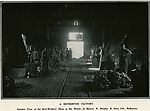 End Welders, N. Hingley & Sons
End Welders, N. Hingley & Sons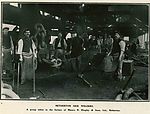 Side Welders, N. Hingley & Sons.
Side Welders, N. Hingley & Sons.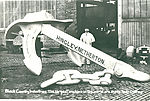 Titanic Anchor
Titanic Anchor Ready To Go
Ready To Go On Its Way
On Its Way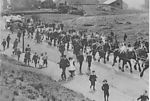 Netherton Celebrates
Netherton Celebrates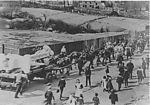 Netherton Celebrates
Netherton Celebrates

The Black Country was not an area renowned for work place harmony, but at Hingley’s good working relations existed as a result of the actions on the part of two family members.
Founder of N. Hingley & Sons Ltd, Noah Hingley, began the policy of fair play towards his workforce by introducing his unique contract, “Conditions for Fair Employment”. Standing in the Parliamentary Election of 1874, Noah Hingley used this document as his sole manifesto in order to demonstrate his form of benevolent paternalism.
His son, Benjamin, played a role in the establishment of the “Midland Iron & Steel Wages Board”, and went on to become chairman, where he established a reputation amongst employers and employees alike for fairness and impartiality.
Every workman was a fee paying member of the Board, which meant that they had a loyalty to the Board, rather than to a Trade Union. Wages were settled on a sliding scale based on the selling price of wrought iron bars. Industrial peace was assured at Hingley’s factory, and those of the other members of the Board, for more than fifty years.
The work of the M.I.S.W.B. resulted in harmony and stability throughout its membership, whereas members of the infamous Chain Makers Association, suffered continuous unrest up to and beyond the 1910 lock out.
When the Liberal Party returned to power in 1906, a programme of welfare reform was introduced which began to replace the Hingley style of benevolent paternalism. Sir George Hingley, given the excellent industrial relations enjoyed for the past fifty years, could not see the need for change. His view that there was no need for unemployment insurance when unemployment was virtually unheard of at Hingley’s, was out of line with events in the country as a whole.
It was due to the efforts of the non-family members, that had been brought in to run the business, that Hingley’s made the transition from an extended family, providing a protected living for thousands, to a fully commercial enterprise, where care for the employees was passed to the state.
Rollover the captions in the box to see the available images in thumbnail format, click the caption to see the full-size image
| Reference: | 686 |
| Keywords: | |
| Archive Ref: | |
| Updated: | Tue 5 Jun 2007 - 14 |
| Interpretation written by | Louis Howe |
| Author's organisation | Curatorial |
| Organisation's website |